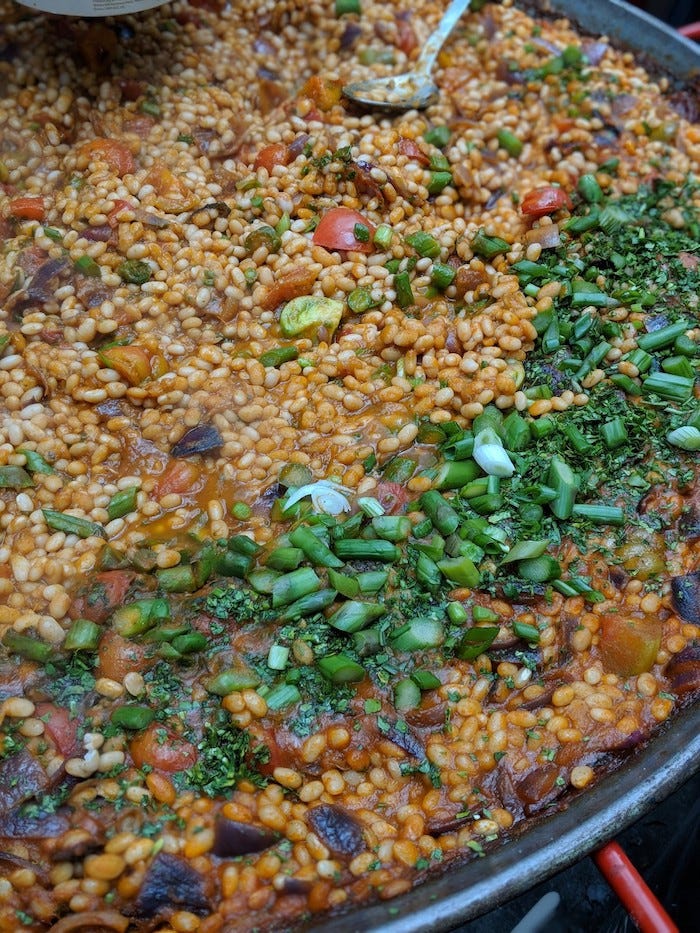Sattva : Issue 13
The perfectionism problem, ingredient spotlight on white beans and what to cook in August
Sattva (सत्त्व) is a beautiful Sanskrit word that has many meanings—spirit, true essence, good sense, wisdom, quality of purity, energy, consciousness and mind, among other things.
Through this fortnightly newsletter, I want to bring to you all things good, which will make your life better. My focus will be on topics such as mindfulness, productivity, slow living and sustainability, accompanied by genuinely useful recommendations of products, books, music, links to read, and of course food and recipes. Through these, I hope to instil some Sattva in your life.
The perfectionism problem

I take forever to submit my work to my editors. I mull over an idea for years before I believe that I can start working on it. This very newsletter is an example of that. I’ve attended a podcasting workshop three years ago and my podcast is yet to take off. I often feel that my work is not good enough and that I could have done better.
I recently read a quote by Brene Brown from her book The Gifts of Imperfection and it hit hard.
“Perfectionism is not the same thing as striving to be your best. Perfectionism is the belief that if we live perfect, look perfect, and act perfect, we can minimize or avoid the pain of blame, judgement, and shame. It’s a shield. It’s a twenty-ton shield that we lug around thinking it will protect us when, in fact, it’s the thing that’s really preventing us from flight.”
While most of the ideas that strike us feel amazing, a lot of the confidence and steam is lost in the journey from idea to implementation. We feel like we cannot do justice to that idea, so why start working on it at all? There is also the fear that the end result may not be satisfactory or that it may not be liked enough.
To be human is to be imperfect, so I often wonder how this need to achieve impossible perfection has set into us.
Nothing innovative comes out of perfection. Remember that old quote, “Nothing ventured, nothing gained.”? To be creative, joyful and satisfied, one needs to get comfortable with failure or less than perfect attempts, what we retrospectively and wrongly label as ‘mistakes’. I would rather call them attempts or learnings. There’s nothing wrong with doing just enough if that is all we are capable of at that point of time for lack of energy, time or capability. It is attempting something that matters more than anything else.
“Healthy striving is self-focused: "How can I improve?" Perfectionism is other-focused: "What will they think?” - Brene Brown
Getting the job done is objective, whereas perfectionism on top of that is subjective. So let’s throw away the pursuit of perfectionism and the resulting procrastination and just get on with doing things in a joyful spirit.
This is as much a note to self as it is a note to you. Henceforth, I am going to dive a bit more recklessly into just doing things without bothering about perfection.
I would love to hear from you in the comments if you have experienced something similar and overcome it. It will be useful for me as well as the other readers of Sattva.
Ingredient spotlight : White beans
Beans and lentils are so versatile that we can never have enough of them. White beans have been a regular in my kitchen ever since I discovered them in Santacruz market, thanks to my friend Preeti. These are neither white rajma nor are they black eyed peas.
White beans are small sized beans that cook quickly and have a neutral flavour unlike most other beans. These beans also go by many other confusing names like navy beans (why!!), haricot beans, Boston beans, white pea beans and pea beans. In India, they are also sold as Mangalore beans in some stores. These are used in the making of baked beans.
Why eat white beans?
1 cup of cooked white beans provides nearly 70% of the daily requirement of fibre, 65% of folate, 30% protein and 25% iron. The fibre plays an important role in blood sugar management. If you are a diabetic, then you must include this legume in your diet right away. Combine white beans with rice or wheat to get all the essential amino acids, and thereby a source of plant-based complete protein.
Cooking tip
Soak the beans for 4-6 hours. Drain the water, add fresh water and pressure cook for 2 minutes (after full pressure / one whistle, reduce the flame to sim and turn off the flame after 2 minutes). Do not add salt to the cooking water as it will toughen the skins and the beans wont cook through properly.
Ways to use
White beans are an excellent ingredient for meal prep. Cook a large batch and keep in an airtight container in the refrigerator. Their excellent nutrition profile and versatile nature are enough reasons to use them often in your dishes.
Salads - combine with other vegetables like bell peppers or greens along with an Italian dressing
South Indian style sundal for snacking or as a part of a meal
Well cooked beans mashed to make fritters along with grated vegetables like carrot, beets or zucchini
White beans make the best addition to any pasta dish. It is the easiest way to make pasta more nutritious for kids.
Make hummus using the cooked beans with some roasted garlic, or along with roasted vegetables like beets or carrots to the hummus [Carrot and white bean hummus]
Add a handful of cooked beans to a bowl of soup
Mashed beans on toast, like avocado toast but healthier. Top with cheese or a poached egg and microgreens to make it a cafe style brunch. [White beans crostini | White beans and eggs skillet ]
Here’s my latest recipe using white beans on my blog - a vegan cassoulet, inspired from a dish I tasted in Borough Market, London. Do try it out!
What to cook in August?
Mint Lounge columns
Queen Victoria’s favourite fruit - Mangosteen - Recipes for Mangosteen Smoothie Bowl and a Mangosteen Gin Cocktail
Meet bathua, the more nutritious cousin of spinach - Recipes for Bathua Raita and Bathua Besan Chila
I would love your feedback on the newsletter. If you like what you read, please share it with your family and friends. I am grateful for your help in reaching my newsletter to a wider audience. See you in two weeks!
Books: Everyday Superfoods | The Everyday Healthy Vegetarian
Blog | Amazon store | Twitter | Instagram
This newsletter may contain affiliate links for some products. As an Amazon affiliate, I may earn a small commission if you purchase something by clicking on my link, at no extra cost to you. It helps support the newsletter.
None of the product mentions are sponsored unless explicitly mentioned. Thank you :)




I struggle with the same perfectionism problem. An old supervisor used to say to me “great is the enemy of good.” So true. Currently sitting on a few unfinished works myself, so thank you for this reminder ❤️
Was a good read Nandita.I think perctionism is more pervasive than we imagine especially amongst us women. We want to be able to wear all our hats absolutely well😅..
Despite my language skills and my knowledge about my subject I used to always second guess myself and end up not publishing any of my cases as a pathology professor, now when I look back at all the missed opportunities because I wanted to get things right the first time around I feel I have lost out on the deep learning that comes from learning from your own mistakes!
The write up on the white bean was also interesting.
I happened to listen to your podcast appearance with Amit Varma, 'The seen and the unseen' it was enjoyable listening to your long winded journey to food.. Could relate to a lot of stuff you talked about especially about medicine and the way the education and practice of medicine changes how you view the world.
Your authenticity and grace shines through whichever social media platform you choose to put out your content. More power to you!